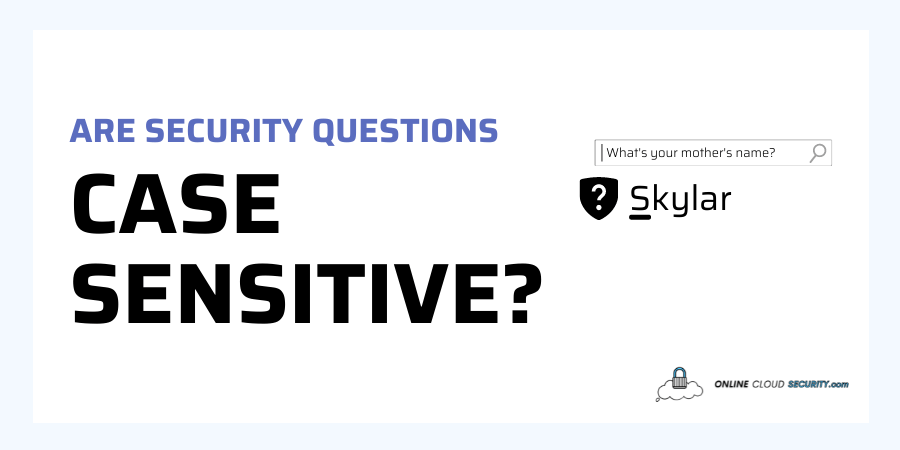

Dave Miller – Tech Enthusiast & Security Expert – January 20th, 2022

Anyone with the internet at their disposal may use numerous services in today’s digital age. Every service available on the internet gets linked to encrypted user information in the form of usernames and passwords. However, if you forget your password and click the forget password label in the hopes of regaining access to their online service, you might get asked to answer some security questions in order to strengthen the security of your logins.
The security question comes in helpful at this time, as they serve as a way of identity identification and get used for self-service password recovery. When enrolling for the first time, the system invites customers to pick and answer a security question based on specific pre-determined guidelines.
With this said, are security questions case sensitive?
Quick Answer: Unless the service provider expressly states that they are case sensitive, security questions are typically not case sensitive, however, you must ensure that the space is present if there is a gap between two words.
Continue reading to learn why security questions are important and if they should be case sensitive or not.
For a long time, security questions have been a prevalent identity identification. These security questions and answers are often used for self-service password recovery for users who have forgotten their password, repeatedly input incorrect credentials, or attempted to log in from a location or new devices. When users repeat the same password across numerous services, a security question may provide an additional degree of assurance—the best crucial security. However, certain websites may utilize insecure security questions that have opposite consequences.
Security Questions are not that fancy; generally, security questions fall into two categories.

Are Security Questions Case Sensitive? The answer depends on the service provider and the type of questions.
If you haven’t been asked about the security question while saving for the first time, it isn’t likely to be case-sensitive. As a general guideline, answer a security question while keeping in mind that you want to answer it swiftly afterward without exerting too much effort on your memory.
It is also easy for security developers not to imply the case-sensitive rule on information provided by the user. The most straightforward approach to achieve this is to lowercase the response before hashing it for storage and lowercase the user-supplied answer before comparing them.
Examples of security questions can be as simple as:
Security questions are not always safe, and users can exploit them to gain unwanted access. This uniformity of security questions introduces a significant yet avoidable danger, and this is because the factual data it contains makes it easier to estimate them. Someone can quickly access the system if they know your mother’s maiden name and the answer to the same security question is as accurate as her name. Similarly, because the name of your first pet never changes, your security questions may get easily hacked.
In late 2014, Yahoo announced that at least 500 million of its users’ data was compromised, including their passwords, email addresses, telephone numbers, dates of birth, hashed passwords, and security questions.
Security questions got designed to increase identity validation; nevertheless, if your account gets breached, that response is already linked to your identity and might be used in a future attack. Like in the case of Yahoo, the security question is already public and waiting to be utilized by someone to get access to your valuable assets.
We can inventive answers to these security questions to make our accounts safer and delete them. When working with security questions, whether as a developer or a user, keep the following tips in mind.
Even so-called good security questions are vulnerable to hackers by their very nature since they aren’t random. Users get expected to respond in meaningful, memorable ways, and extensive research might get used to getting such answers by hackers.
While we usually control the passwords we pick, we do not always control security questions. Because security questions rely on the knowledge, they are open to exploitation. On the other hand, security questions may get phased out since adequate alternatives exist.
Popular web services attempt to transition away from security questions and improve solutions. However, if you’re dealing with a security question, Remember that security question answers are not case sensitive, so don’t waste time changing the case of certain characters. Lying in your security responses is the most fantastic way to make them more resilient.
**Onlinecloudsecurity.com is a participant in the Amazon Services LLC Associates Program, an affiliate advertising program designed to provide a way for websites to earn advertising revenues by advertising and linking to Amazon.com and affiliated sites. As an Amazon Associate we earn affiliate commissions from qualifying purchases.**

Dave Miller is an IT Consultant for Online Cloud Security and has over 7 years of experience in the Information Technology space. He also specializes in repairing laptops & computers. In his spare time, he loves to talk about new technologies and hosts monthly IT and Cyber Security meetings in the Houston area.
Click any button down below to share this article on the following channels:

Online Cloud Security is here to recommend you the most secure devices, from laptops to smartphones, we only want to provide you with products that we have tested and used ourselves for online security. Every product that we recommend is heavily inspected and tested for security against hackers, viruses, malware, and any other intruders that may want to steal your information.

Online Cloud Security is here to recommend you the most secure devices, from laptops to smartphones, we only want to provide you with products that we have tested and used ourselves for online security. Every product that we recommend is heavily inspected and tested for security against hackers, viruses, malware, and any other intruders that may want to steal your information.
Your Trusted Source for Online Security